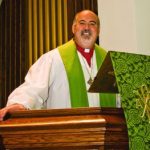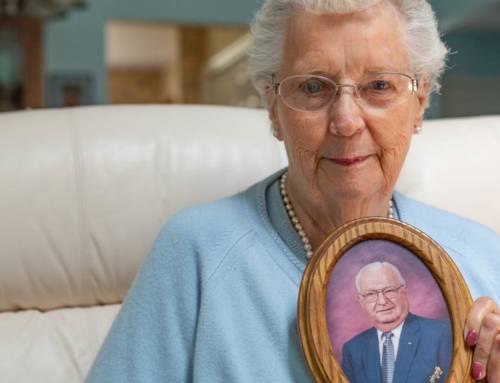
About the Author: Sunday Sermons from Sell Chapel are written by Rev. Preston Van Deursen, Director of Pastoral Care at the Masonic Village at Elizabethtown.
In the musical, West Side Story, Leonard Bernstein’s modern paraphrase of Romeo and Juliet, Tony and Maria, the two lovers, confidently sing that there will be “a time for us,” a time when their day for true love will arrive, a time when all the pieces will fit together, a time when the fulfillment they dream of will be realized, a time when human life will make sense, a time when the mysteries and questions will be resolved, a time when they will have the confidence they have not lived and loved in vain.
Many of us love that musical, because like Romeo and Juliet, it speaks to some of our deepest human longings and needs. We labor and toil, we love and fight, strive and endure, because we think some day it will all come together like the finale of some grand symphony. Someday, we think the cold gray of January will melt into a perpetual June, busting out all over with flowers of success and blossoms of happiness. Somewhere, someday, there will be a time for us, a time when our career will come to its zenith, a time when the children will fulfill our expectations and hopes for them, a time when financial security will arrive, and we will not have to worry so much about the end of the month, or the end of the year. How we long for that time. A time when we will be happy and carefree with no worries, retired, living the dream.
And yet, how quickly time passes us by, You know, even the young sense it. Middle school students wonder where the time goes. Those of us as we grow Older who used to have time on their hands, now wonder if they have any time at all. One businessman remarked that weeks seem like days. Time seems to pass so quickly.
How true that is how often so many of you express those sentiments.
The Bible is full of the awareness of time. The writer of Ecclesiastes says, God “has made everything beautiful in its time,” and that there is a right time for everything. The prophets speak of the appointed time of the Lord, the time for judgment and destruction, or the time for mercy and salvation.
John the Baptist began his preaching with an urgent sense of time, saying “the time is fulfilled, and the kingdom of God is at hand; repent and believe the gospel”. Jesus and Paul speak repeatedly about the importance of time, as do most writers of the New Testament.
It will not do to say all time is alike, that one age is exactly the same as another, or that one life has exactly the same timing as another. There is a tide in the affairs of men, says Shakespeare, which needs to be taken at the flood, else it may not return again for our benefit. There are the significant days, the opportune moments, of which we need to make the most, when timing is everything. There can be a time for us.
And yet, we need to see the time from a different perspective. The writer of Psalm 90 urges us to count our days, to get a heart of wisdom. Paul, in the Ephesian letter, suggests we redeem the time, that we make the most of the time, because the days are evil.
We wonder, will there be a time for us? How shall we make the most of the time? How much time is left. How shall we understand this gift called time?
When we are young there is an adolescence of time.
It is characteristic of children and youth to be oblivious to time. To a young child, a day can be an eternity, especially if it is the day before Christmas. To a preschooler, a week is very long and a year unimaginable. Preschoolers live from one moment to the next, from one cookie to the next; from one television program, one hug and nighttime prayer by daddy, or one trip to the ice cream store to the next. In their innocence, they know night and day, and summer and winter, but they have little sense of the transitory state of time.
Adolescence frequently is an extension of the child’s nonchalance about time. Thankfully youth are optimistic, even if superficially and blithely so. They have a way of expecting their time to come. Many believe theirs will be a better world, that things will be improved when they have their day, and they tend to live in the present as if there were plenty of time for what they want to do. Many think they are immortal, as you can tell from the way they ride their bikes or drive their cars. For most youth, the future is open, and the present is to be enjoyed.
Institutions and nations also can have an adolescent sense of time. Churches often have to grow up. Many young churches go through the naivety and willful childishness of children. Cities often go through stages of unbounded optimism, mature reflection, and old age despair. Our nation seems now to have advanced beyond the boundless optimism of its youth, to the pensiveness and self-doubt of middle-age.
“Will there be a time for us?” we ask. “Of course,” the world responded. “There will be a time for everybody,” we said in the adolescent enthusiasm of the enlightenment and the youthful optimism of the late nineteenth century. Our time is coming.
But the adolescent sense of time is only part of the story. There is also the middle-age sense of time.
It is difficult to define middle-age chronologically. I find increasingly that many people push the definition of middle-age to a higher and higher age bracket. (It’s a floating definition, much like the definition of young.) If the adolescent sense of time can extend into the thirties, the middle-age sense of time can at least come down to pervade the forties.and now through the fifties. You know how many times I hear other residents say they have a hard time sometimes living here because of all the old people
There are many signs of middle-age. For example, the adolescent has no children, but has all the advice on how one ought to raise them. The middle-aged person may have six children and very little advice. The adolescent presumes to have most of the answers to life, whereas the middle-aged person is more and more perplexed with the tough questions, and has fewer and fewer real answers. The adolescent goes full steam ahead in profession or career, asking few questions as to why or where. The middle-ager looks longer now at days past and days to come, lingers over questions of meaning and destiny, and wonders if his time really will ever come.
It is difficult to define middle-age, but we can say it is a time when boundless optimism gives way to careful reflection. It is a time where carefree exuberance bows to cautious planning. Middle-age knows the truth of the old saying, “Life is uncertain, eat dessert first!” Middle-age is the realization that we are not immortal, that our presumed security is not so secure after all.
Consequently, the middle-age mentality often succumbs to the temptations mentioned in Ephesians. Aware that time is passing us by, we begin to use time frantically, attempting to create significant moments. Conscious that our time has not come, we often resort to hedonism. Newly conscious of the guilt of the past and our fear of continued failure, we resort to age-old attempts at ecstasy. In facing the transitory state of life, we are tempted to grasp things and persons, pleasures and pastimes, to give us security and significance. We call it mid-life crisis
Like the prophet Jeremiah we lament, “The harvest now is over, the summer days are gone, and yet no power cometh to help us”. The children are born and nearly grown, the career is well launched and plateaued, and yet no power seems to have come to help us, to give us a sense of significance and fulfillment. Will time pass us by?
Institutions and nations face middle-age also. Our great land struggles now with its identity corporately, as we do individually. As philosopher William Barrett says in his book, Time Of Need, “Contrary to the confidence in our powers of technology and information, the prevailing image of man we find in modern art is one of impotence, uncertainty and self-doubt.”1 Barrett goes on to comment about the middle-age of our nation, saying, “the discontent that now creeps through modern culture is the self-doubt of a civilization that has lost faith in its own value. This doubt,” says Barrett, “has even shaken our confidence in progress which was once an unquestionable article of faith.”
The days can be evil. Some of us find personal fulfillment in history; some of us do not. Some of us are happily married; some of us are not. Some of us are enjoying the sweet fruits of success; some of us are not. Some of us are fulfilling our potential, actualizing the full extent of our powers; some of us are not. Some of us can look back on our lives with satisfaction and contentment; some of us cannot. Some of us are proud of our children; some are not. Some of us have fulfilled our dreams and ideals; some have not.
Paul urges us not to despair the times, but to make the most of them. Use every opportunity you have, but do not expect you will climb every mountain and at last find your dream. Some enchanted evening you may see a stranger across a crowded room, and make them your own; but then again, you may not.
Paul says that the days can be evil. Do not expect everything to go well just because you think yourself good or righteous. Trouble comes to the just and the unjust. Evil attacks the righteous and unrighteous. If through providence and chance your time really comes, thank God and be glad. But if not, know that the times of God go beyond history, and that his destiny is to bring us all into unity with himself; which will be the ultimate time beyond time.
Which brings us to the time of old age.
I am reminded of the older couple who lived close to a church whose bells rang out the hour of the day. At two in the morning the bells went crazy. Instead of ringing twice to denote 2 a.m., they kept ringing up to 100 times. The man nudged his wife in bed and said, “We’d better get up, dear. It’s later than it’s ever been before!” Probably many of us sometimes feel that way.
The time of old age is well known in the Bible. Job says, “Man born of woman lives but a few days.” Every older person agrees with James who observes, “What is your life? For you are a mist that appears for a little time and then vanishes”
The writer of Psalm 90 says we are like a watch in the night. We are awakened for our turn to stand guard, and then we are gone, forgotten. Or we are like the grass, which in the morning is fresh and vigorous, but in the evening, after the heat of the day, withers and dies.
Our life is seventy years, or eighty at the most, says the psalmist. Yet, their pride is but toil and disappointment, for it is soon gone, and we pass away. Every older person, lonely at home or bored at a nursing home, knows something about this melancholy mood, this transitory state of life. With the writer of Ecclesiastes, they wonder if life is not ashes to ashes, dust to dust. In the weariness and loss of strength and independence, in the aches and pains of old age, it is easy to wonder if it all was for naught. The seventy, eighty, or ninety years that are unimaginable to the adolescent or distant to the mature woman, are but as nothing to those who have reached them, the years flying away as a bird we can neither capture nor follow.
Will there be a time for us? Yes, but not simply or naively or easily. For Psalm 90 teaches we are subject to tragedy. The psalm teaches us what all great tragedies teach – that the best and the brightest, the most noble and heroic, the most beautiful and powerful and brilliant are subject to judgment and death. “The tragedies,” said theologian Paul Tillich, “reveal the tragic situation before the divine. Even the tragic hero who becomes great and proud and tries to touch the Divine sphere, comes to despair and destruction.”
Thus the tragic heroes in our day rise and fall. Jack Kennedy, a symbol of a new jet-setting nobility, who presumably knew how to handle power, was assassinated. Martin Luther King, Jr., the great civil rights reformer, was gunned down by a sniper’s bullet. Rock stars literally are shooting stars, which flash across the headlines, and then burn out in their own atmosphere of drugs, sex, and desperate narcissism. Celebrities rise and fall, and we rise and fall with them, searching for that special time for us, at least vicariously. Even West Side Story’s youthful Tony and Maria do not survive to fulfill their dreamed-of time, just as Romeo and Juliet did not survive. Their time did not come as they hoped.
So the psalmist urges us to count our days to get a heart of wisdom. “The wise heart,” said Paul Tillich, “is the heart which does not try to hide this from itself, which does not try to escape into a false security or a false cynicism. The wise heart is the heart which can stand this knowledge courageously, with dignity, humility, and fortitude.”
The time of old age needs to teach us that although we may be close to dust, we are more than dust. Though like the animals we go down into the earth, we know there is something within that is more than earth. The entire Bible speaks of hope superseding tragedy. Because of God’s unending love, the cycle of dust to dust is broken. Because of the grace of Christ, the great numbers of us who really never find our place in the sun, who suffer disease and poverty, oppression and death, and who really never come into their own time, will be given their time beyond time.
There is a time for us. There is a time for you. For some, this year will be a fulfilling, satisfying time. Some will achieve and enjoy success and happiness. But for some, this may not be that time. The real time is beyond time, in hope, in resurrection, in the eternal life of God, which is a gift and not an achievement. We are destined, says Paul in Ephesians, to be full of love and eventually to be united with God in the ecstasy and joy, which are beyond time.
Let us live then, young or old, with the confidence that whatever happens, God is for us, that nothing can separate us from his love for us, that our times are in his hands, that we are his.




